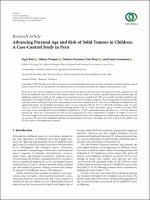Advancing Parental Age and Risk of Solid Tumors in Children: A Case-Control Study in Peru
Related Resource(s)
https://www.hindawi.com/journals/jo/2018/3924635/Date
2018Author(s)
Rios, Ligia
Vásquez, Liliana
Oscanoa, Mónica
Maza, Iván
Gerónimo, Jenny
Metadata
Show full item recordAbstract
Las causas del cáncer infantil no son bien conocidas, pero la edad avanzada de los padres se ha sugerido como factor de riesgo para el cáncer infantil en varios estudios observacionales. En este estudio, se examina un posible vínculo entre la edad de los padres y los tumores sólidos infantiles. Se realizó un estudio de casos y controles hospitalario (310 casos y 620 controles, emparejados por edad y sexo) en el Hospital Rebagliati, Lima, Perú. Se utilizó la razón de probabilidades para comparar las categorías de edad materna y paterna avanzada con y sin ajustar por posibles factores de confusión. The causes of childhood cancer are not well known, but the advanced age of the parents has been suggested as a risk factor for childhood cancer in several observational studies. In this study, we examine a possible link between parental age and childhood solid tumors. Methods. We conducted a hospital-based case-control study (310 cases and 620 controls, matched by age and gender) at Rebagliati Hospital, Lima, Peru. Odd ratio was used to compare categories of advancing maternal and paternal age with and without adjusting for possible confounding factors were calculated. Results. The risk of childhood retinoblastoma was significantly higher among children of mothers aged> 35 years (adjusted OR 1.21; 95% CI, 1.09-6.08) and fathers aged> 35 years (OR 1.17; 1.01-16.33). A significant trend with increasing mother's age (p = 0.037) and father's age (p = 0.005) was found. There were more risks to development of non-Hodgkin's lymphoma (p = 0.047) and gonadal germ cell tumors (p = 0.04) for advanced paternal age. There was a strong protective effect of increasing parity on risk of solid tumors in children (p=0.0015). Conclusion. Our results suggest that advanced parental age is associated with the risk for the development of retinoblastoma. Advanced paternal age increases the risk of non-Hodgkin lymphoma and gonadal germ cell tumor. The higher the order of birth of the children, the less the chance of developing any neoplasm.
Collections
- Artículos científicos [891]






